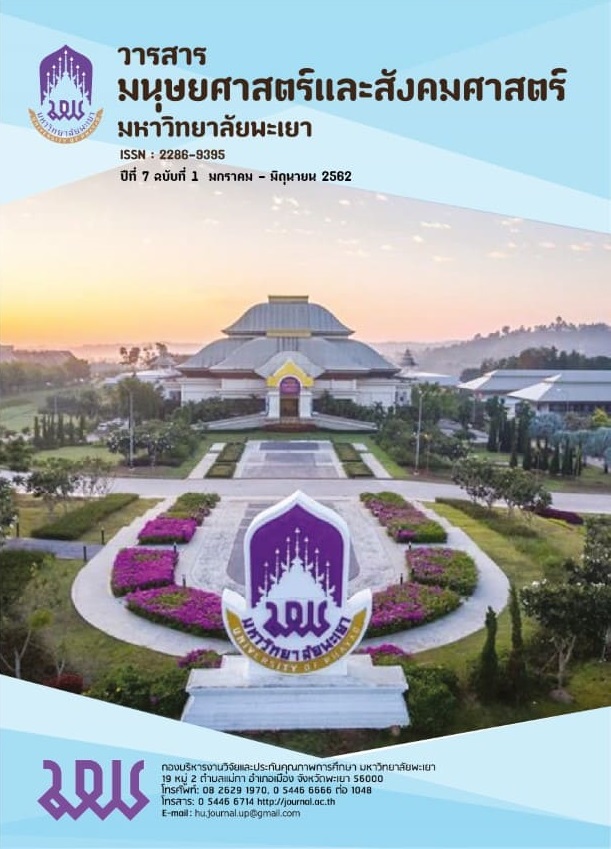Development on Thailand’s practice toward Migrant Workers, 1978-2008: Government Views and Policies
Keywords:
Thailand’s migration, Migrant worker, Migration policiesAbstract
Thailand's economic competitiveness has continued to depend on cheap and unskilled labor and has paid little attention in technology development. The country has been unable to reach a concrete policy on foreign workers, instead relying on incoherence policy; imbalance of labor demand and supply and vague goals. Without an effective policy on immigration, Thailand has been facing with many problems, including the illegal actors who benefit from undocumented immigrants.
The article focuses on the development of Thailand’s measurements in response to the flow of immigrant workers during 1978 – 2008 and aims to contribute a new understanding on Thailand’s migration policies in aspect of government views in each transitional period. It is arguable that the evolution of policies during this period is that Thailand’s policies on managing migrants are not designed with a holistic approach, but instead isolates migration issues from the domestic labor market, without long-run policies, and overlooked the actual causes of the problems. National Security is the crucial fundamental on the government view. Hence, The Thai government has been concerned with and has attempted to solve this problem for many years, though after three decades of development, Thai policies in managing migrant workers are still ineffective.
References
Bangkok Biznews, 10 June 1996.
Bangkok Biznews, 23 December 2006.
Dailynews Online. (2018). Unlock 12 preserved occupations for only Thais to Migrants. Accessed Sep 20. (2018). https://www.dailynews .co. th/politics/645695.
Declaration of Prime Minister's Office about Management of Committee on Illegal Migrant Workers Administration BE 2544 (2001). (2001, October 1). Royal Gazette, 118, 96ngor.
Department of Economic and Social Affairs. (2013). International Migration Policies Government Views and Priorities. New York: United Nations,13.
Department of Employment. (2002). Annual Performance Report of Fiscal Year 2001. Bangkok: Ministry of Labor.
Foreign Employment Act BE 2521. (1977, July 21) Royal Gazette, 95, 73.
Foreign Employment Act BE 2544 (2001) (No.2). (2001, September 30).Royal Gazette, 118, 57.
Foreign Employment Act BE 2551 (2008). (2008, February 22). Royal Gazette, 125, 37.
Government officer of The Office of the Security Council, Interview, 20 August 2015.
Government Policy Statement under Prime Minister Thaksin Shinawatra, 26 February 2001.
Kachatphai Burutpat (the former Secretariat of Thai National Security Council), Interview, 12 March 2016.
Kachatphai Burutpat. (2015, March 20). The former Secretariat of Thai National Security Council [Personal interview].
Krittiya Archavanichkul. (1996) . An Analysis of Situations of Migrant Workers and Policy Choices for importing Migrant Workers to Thailand. Nakornpathom: Mahidol University.
Matichon Economics, 24 November 1992.
Minute of meeting General discussion debate House of Representatives, 29 September 1977.
Minutes of the meeting of the general discussion debate in the House of Representatives, 29 September 1977.
Minutes of the Ad Hoc Committee for consideration of Foreign Employment Act …. Meetings, 2/1978, 8 March 1978.
Minutes of the Ad Hoc Committee for Consideration of Foreign Employment Act …. Meetings, 1 / 1978, 1 March 1978.
Ministry of Interior, Official Letter on 16 January 2006, Report on Consideration of Illegal Migrants’ issues.
National Economic and Social Development Board. (1976). The Fourth National Economic and Social Development Plan (1977-1981). Bangkok: Office of the Prime Minister.
Occupations and Professions Promotion Act BE 2484. (1941, October 10) Royal Gazette, 583, 19.
Panita Sornsri. (2016). “Rang-ngan Tangdaw: khwam samkhan lae khan chatkan” [Migrant Workers: Importance and Management]. p1. (Unpublished document).
Panthip Kanchanajitra Saisunthorn. (1997). Entering to Thailand of Migrants to Work: A survey about Laws, Problems and Policy Choices. Nakornpathom: Mahidol University.
Prachachart Weekly, 15 January 1976.
Prachachartbiz news, 10 June 1996.
Prachachart Biznews, 15 December 1992.
Rangsan Thanapornpan. (1989). Policy Formulation Process of Thailand’s Economic policies: An Analysis of Economic History and Politics, [1932 – 1987]. Bangkok: Chulalongkorn University.
Record of Parliament meeting 30-32 (general legislature) no.12.
Record of 30-32 Parliament meeting (general legislature) No.12.
Revolution Order No. 281. (1972, November 25). Royal Gazette, 89, 180, 1-15.
Revolution Order No. 322. (1972, December 13). Royal Gazette, 89, 190, 97.
Royal Decree on Determination of Occupations and Professions for only Thais BE 2485 (1942). (1942, August 20) Royal Gazette, 49, 35.
Siamrat, 14 July 1977.
Thai encyclopedia for the youth. Rain and Strom in Thailand, Strong tropical typhoon case in Thailand. Accessed Sep 30, 2018. https://www.saranukromthai.or.thsub/book/ook.php?ook= 4& hap=7&page=t34-7 -infodetail08.html.
Thailand Development Research Institute. (2003). Final Report on Guideline to Determine a Levy tax for Migrant Workers. Bangkok: Ministry of Labor.
Thansettakij, 6-8 January 1994.
The Manager Weekly (Special Edition), 29 January – 4 February 1990.
The World Bank. (2018). The World Bank in Thailand: Overview, Accessed Sep 30, 2018. https://www.worldbank.org/en/country/thailand/overview.
United Nations. (2013). International Migration Policies: Government Views and Priorities. Accessed Jun 10, 2015. https://www.un.org/en/development/desa/population/publications/pdf/policy/InternationalMigrationPolicies2013/Report%20PDFs/z_International%20Migration%20Policies%20Full%20Report.pdf
Downloads
Published
How to Cite
Issue
Section
License
ผู้นิพนธ์ต้องรับผิดชอบข้อความในบทนิพนธ์ของตน มหาวิทยาลัยพะเยาไม่จำเป็นต้องเห็นด้วยกับบทความที่ตีพิมพ์เสมอไป ผู้สนใจสามารถคัดลอก และนำไปใช้ได้ แต่จะต้องขออนุมัติเจ้าของ และได้รับการอนุมัติเป็นลายลักษณ์อักษรก่อน พร้อมกับมีการอ้างอิงและกล่าวคำขอบคุณให้ถูกต้องด้วย
The authors are themselves responsible for their contents. Signed articles may not always reflect the opinion of University of Phayao. The articles can be reproduced and reprinted, provided that permission is given by the authors and acknowledgement must be given.








